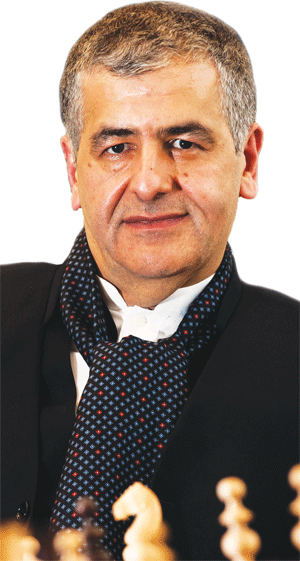A year after lawyer Javad Heydary disappeared amid client claims for $3.6 million in missing trust money, a Superior Court judge has ordered LawPRO to indemnify them.

On Oct. 28, Justice Michael Penny found Samira and Hasan Abuzour are owed the amount remaining from Heydary’s $1-million coverage under LawPRO’s innocent-party insurance.
Heydary, the former managing director of Heydary Hamilton PC, disappeared last November amid litigation over the missing funds he had been holding in trust for the Abuzours. He was later declared dead.
The $1-million coverage Heydary purchased for 2013 was well over the $250,000 minimum required under LawPRO’s policy. The policy allows LawPRO to use some of the funds to investigate and defend any claims that arise against a lawyer it insures.
If Penny’s decision stands, LawPRO would pay the Abuzours the coverage amount minus the cost of investigating and defending the claim. Dan Pinnington, vice president of claims prevention and stakeholder
relations at LawPRO, wouldn’t say what the remaining amount is because the matter is still an “active file.”
Despite LawPRO’s argument that it’s under no obligation to pay the amount directly to the clients of Heydary, Penny said that’s exactly what the insurer must do as the insurance is a debt subject to garnishment.
“I do not agree with counsel for LawPRO that, simply because the insurance under the 2013 policy is payable on behalf of the insured as opposed to directly to the insured, the insurance cannot be a debt subject to garnishment under rule 60.08,” wrote Penny in
Abuzour v. Heydary.
He added: “It would, in my view, be placing form over substance to conclude that LawPRO’s insurance obligation vis-à-vis Heydary and Heydary Hamilton do not constitute a debt subject to garnishment in these circumstances.”
There was no dispute as to whether LawPRO’s innocent-party insurance covers what happened to the Abuzours.
“LawPRO admits the policy covers the very situation that has occurred in this case,” Penny noted.
Mark Adilman, counsel for the Abuzours, said the decision was a “welcome” one.
“Justice Penny’s decision was welcome; however, as far as I know, LawPRO has not yet determined if it intends to appeal,” he said.
LawPRO had also argued that using up the funds available under the innocent-party coverage for the Abuzours’ claim would deplete the resources available for investigating and defending claims against other lawyers who worked with Heydary should they face a lawsuit as well. Those lawyers are facing the threat of litigation from the Abuzours, LawPRO said.
But that argument failed after the judge saw a clear obligation by LawPRO to pay the Abuzours in any case. “It is not disputed that this falls within the scope of coverage under the 2013 policy — that it is an amount the insurers are ‘legally obligated to pay’ to the Abuzours within the scope of the 2013 policy.
Accordingly, Heydary and Heydary Hamilton are legally obligated to pay an amount which LawPRO has agreed, under the 2013 policy, to pay on their behalf,” wrote Penny.
“There is a clear indemnity obligation which has crystallized and is due and payable. I fail to see how this creates any conflict with a potential duty to provide a defence to others in the future, especially when there is no evidence that such claims even exist.”
Toronto lawyer Darcy Merkur says Penny’s decision essentially says the fact other claims could arise shouldn’t prevent justice for victims in cases like this.
“What he is saying is that the possibility of other people claiming against the policy later is not going to stop the victims from getting their money now,” says Merkur, a partner at Thomson Rogers. “The judge takes a very practical approach and says, ‘When somebody’s been victimized like this, we’re not going to wait for other potential people to come forward; we’ve got to address the victims’ claim immediately.’”
Penny noted the 2013 policy was mandatory and the purpose of it was to protect the public from the fraudulent act the Abuzours were victims of.
“It seems to me the courts should not promote form over substance and thereby thwart the public policy objectives behind mandatory insurance.”
According to Pinnington, LawPRO’s available innocent-party sublimit coverage for lawyers includes options of $250,000, $500,000 or $1 million per claim.
The selected amount is the most the insurer has an obligation to pay under the policy on behalf of the lawyer and the firm, Pinnington noted in an e-mail to Law Times. “The inclusion of more than one firm lawyer in the claim does not operate to increase the amount that the insurer must pay,” he said.
But to Penny, to accept the argument that the coverage wouldn’t be available should the plaintiffs add another lawyer to the claim would be “to impose a bankruptcy-like scheme of pro rata distribution.”
“To accede to LawPRO’s argument in this case would, in effect, be to impose a bankruptcy-like scheme of pro rata distribution onto a set of contractual rights which neither created, nor even contemplated the existence of, such rights,” he wrote.
For more, see "
Clients to seek millions from Heydary's estate" and "
Lawyer 'surprised' after LSUC takes control of Heydary firms."

 On Oct. 28, Justice Michael Penny found Samira and Hasan Abuzour are owed the amount remaining from Heydary’s $1-million coverage under LawPRO’s innocent-party insurance.
On Oct. 28, Justice Michael Penny found Samira and Hasan Abuzour are owed the amount remaining from Heydary’s $1-million coverage under LawPRO’s innocent-party insurance.